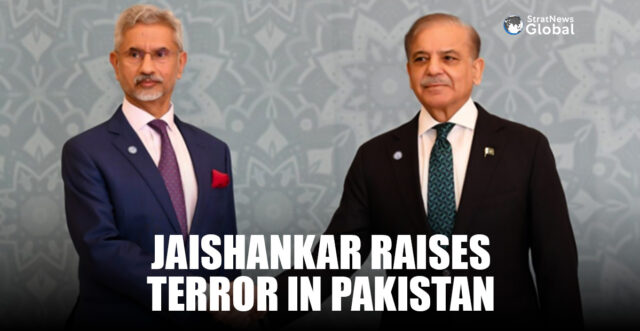
External Affairs Minister Dr S. Jaishankar emphasized the foundational principles of the SCO Charter, which focuses on combating the three evils of terrorism, separatism, and extremism, in Islamabad on Wednesday.
Dr Jaishankar, the first Indian minister to visit Pakistan since a visit by his predecessor Sushma Swaraj in 2015, was addressing delegates at the 23rd meeting of the Council of the Heads of Government of the member states of the Shanghai Cooperation Organisation.
Highlighting the crucial relevance of the SCO Charter’s Article 1, which outlines the organization’s primary objectives—building trust, promoting cooperation, and maintaining regional stability, he said these objectives are more critical than ever given the current global landscape marked by conflicts, climate crises, and economic challenges.
Delivered 🇮🇳’s national statement at the SCO Council of Heads of Government meeting today morning in Islamabad.
SCO needs to be able and adept at responding to challenges facing us in a turbulent world. In this context, highlighted that:
➡️ SCO’s primary goal of combatting… pic.twitter.com/oC2wHsWWHD
— Dr. S. Jaishankar (@DrSJaishankar) October 16, 2024
“The SCO was committed to combatting three evils: terrorism, separatism, and extremism,” he said, emphasizing that these threats undermine regional cooperation, peace, and economic growth. He also called for an honest assessment among SCO members, pointing out that trust and cooperation remain inadequate and urging the organization to reaffirm its commitment to the Charter’s principles.
The minister further warned that activities across borders involving terrorism, separatism, and extremism pose significant barriers to economic initiatives like trade, energy connectivity, and people-to-people exchanges—pillars that the SCO aims to strengthen.
Without naming Pakistan, his remarks clearly echoed concerns over cross-border terrorism, a long-standing issue between India and Pakistan.
Dr Jaishankar also touched on broader global challenges such as financial instability, supply chain disruptions, and the growing threat of climate change. However, he consistently linked these concerns back to the need for peace and stability, reiterating that the SCO’s success depends on unwavering opposition to terrorism and related threats.
This visit by Dr Jaishankar, framed within the context of multilateral cooperation, comes at a time of strained India-Pakistan relations, further spotlighting the SCO as a crucial platform for regional dialogue. While avoiding direct references to bilateral tensions, the minister’s speech underscored India’s commitment to fostering collective growth and security, provided the principles of sovereignty, territorial integrity, and mutual respect are upheld.
In reaffirming India’s support for the SCO’s mission, Dr Jaishankar called for the development of an agenda built on shared interests and the need for reformed multilateralism, including reforms to the UN Security Council to make it more representative of the developing world.
While some analysts feel that Dr Jaishankar’s participation in this meeting marks a milestone in India-Pakistan diplomatic interactions and could potentially lay the groundwork for broader regional engagement, New Delhi insists its position that no talks are possible until and unless Pakistan stops exporting terror remains unchanged.
In a career spanning three decades and counting, Ramananda (Ram to his friends) has been the foreign editor of The Telegraph, Outlook Magazine and the New Indian Express. He helped set up rediff.com’s editorial operations in San Jose and New York, helmed sify.com, and was the founder editor of India.com.
His work has featured in national and international publications like the Al Jazeera Centre for Studies, Global Times and Ashahi Shimbun. But his one constant over all these years, he says, has been the attempt to understand rising India’s place in the world.
He can rustle up a mean salad, his oil-less pepper chicken is to die for, and all it takes is some beer and rhythm and blues to rock his soul.
Talk to him about foreign and strategic affairs, media, South Asia, China, and of course India.




